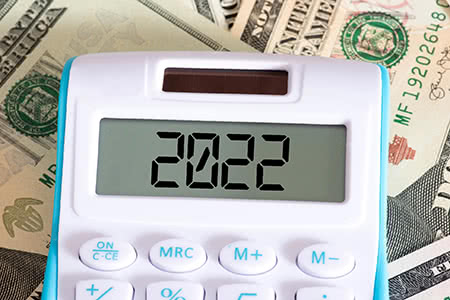
It's soon going to be the start of another new year, which always gives us that "fresh start" feeling. What is it you'd like to see happen for you in the next year? What are your plans and dreams? How do you intend to achieve them?
No matter what you have on your roster, it's a sure bet that money plays a part. So, here are 5 ideas for how to commit to better money habits—and maybe even find some surprise savings—to fuel whatever you're dreaming and scheming for in 2022.
Pay Attention to Your Negative Thoughts
Sounds like the opposite of what you'd like to do, right? But the truth is, when we turn away from negative thoughts and feelings, we often turn toward something to wash them away: the quick adrenaline rush of buying something, high-fat foods and salty snacks, and other things that feel like "rewards." But sometimes those rewards simply reinforce the situation you were trying to avoid (carrying big credit-card balances, or a few extra pounds). And here's the really cool thing: embracing those negative thoughts, feelings and emotions leads to... less of those things. Really! Science says so. And those negative feelings also have cues we need to listen to; they are our mind's way of trying to get our attention, so we can change the habits (overspending, overeating) that bring bad feelings our way.
Make a Date with Your Money
The start of the new year is the perfect time to make financial plans — but don't just think about what you'd like to do; get out a calendar and commit. Mark all your critical money dates on this calendar, like filing annual or quarterly taxes. And then make a monthly appointment with yourself (and your partner) to sit down and look at what money is coming in and what money is going out. Financial therapist Amanda Clayman calls her own biweekly money meetings with herself "Amanda Loves Money," as a way to remind her that taking care of her finances is a way of taking care of herself. Do the same, and you'll reach all your financial goals much faster.
Embrace the Budget
Unfortunately, budgets have gotten a bad rap, implying discipline, saying no and not getting what you want. But here's the flip side we don't talk about enough: budgeting actually sets you free. How? Documenting cash in/cash out is the simplest way to describe it. Once all your "musts" are paid for—generally, housing, utilities, transportation/car, groceries, insurance, and any debt payments—you have a clear view of what's "left over." So you can then decide to budget $40 or a month for manicures or football games or dinners out—and make those items part of your plan, so you never have to double-think yourself again. (Can you afford it? Sure, it's in your budget!) Budgeting also helps because then if you have a month where you car costs more, say, you can "cancel" your dining-out budget, and always feel the relief of being in charge of your money—instead of your money's being in charge of you. For a basic budgeting worksheet, try here, or even better, let a budgeting app like Firstly set up a monthly budget for you, using the information it receives once you link up your bank accounts.
Make Automatic Withdrawl Your Friend, Not Your Enemy
Some things are the easiest when we don't have to think about them. This is why automatic payments are so important—and also, something to watch out for. Gyms we don't attend anymore, for example, earn $25 a month because the money just quietly leaves our bank account, and we keep forgetting to cancel. Or what about that teensy monthly fee for that app you never use anymore, that you can't be bothered to unsubscribe to? Well, every dollar adds up, and this is easy money for you to reclaim. Go through a year of monthly bank statements to find these sneaky offenders, and get them off your balance sheet.
But you can also harness that tendency to forget about automatic payments and use it in your favor: Set up an automatic contribution to your savings account on the days you get paid—and remove the friction of needing to remember or find the self-control. Even sneaking small amounts away, $20 at a time, really adds up, as your gym knows. Challenge yourself to grow that automatic contribution after six months. And be sure you're contributing the most you can to your 401(k), too. Same rule applies!
Take a Moment to Love What You Already Have
Not all attempts to save money need to feel like sacrifices. Sometimes we go blind to the things we already own, just because they've "been around." But take a little time to "shop your closet" or a host a garage sale you're holding for yourself. Poke through all your storage spaces and find items you forgot you had, or think up new uses for them. And if you find only things you don't—and won't?—use? Then host that garage sale and get a couple more bucks in your pocket.
Getting your finances in order and building them up can be a journey of a thousand steps. But with tips like these, you'll be more conscious and connected to what you have, what you spend, and what you need—and that goes a long way to setting you up for a money-savvy year.
If you are burdened with high amounts of credit card debt and are struggling to make your payments, or you’re just not seeing your balances go down, call Timberline Financial today for a free financial analysis.
Our team of highly skilled professionals will evaluate your current situation to see if you may qualify for one of our debt relief programs. You don’t have to struggle with high-interest credit card debt any longer.
Call (855) 250-8329 or get in touch with us by sending a message through our website https://timberlinefinancial.com.
 855-250-8329
855-250-8329
